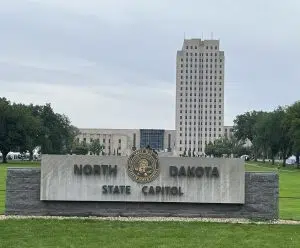
(North Dakota Monitor) -Leaders guiding a program to invest state money in North Dakota are puzzling over the best way to share its work with the public in a sector where too much transparency can scare off business partners.
The Growth Fund, established in 2021, has two main goals: to make money for the state and to stimulate North Dakota’s economy, according to the program’s website. It invests money from the state’s Legacy Fund — which is made up of revenue from oil taxes — into private capital.
Private capital refers to investing in privately-held companies or other assets, as opposed to those that are publicly traded. Boosters of the Growth Fund say putting state dollars into private capital will drive innovation and help North Dakota communities strengthen and diversify their economies.
It’s a complicated and delicate process, which makes the Growth Fund difficult to explain to the public, said Sen. Jerry Klein, R-Fessenden.
“It’s close to rocket science,” said Klein, chair of the Legacy and Budget Stabilization Fund Advisory Board, which makes policy recommendations related to the Legacy Fund.
Officials have already made an effort to publicize information on the Growth Fund’s progress. The private firm that manages the fund, 50 South Capital, released a year-end report in December, for example.
Yet there’s a lot about the Growth Fund that’s off limits to the public. The state doesn’t publicize how much money it pays 50 South to manage the Growth Fund. 50 South doesn’t disclose how much Growth Fund money it’s committed to individual businesses in its portfolio, either. In both cases, the information is considered a confidential trade secret.
The state is still figuring out how to balance both these interests, said State Treasurer Thomas Beadle, who sits on the State Investment Board. There’s an ongoing discussion over whether the public should know more about how Growth Fund dollars are spent, he said — and if so, whether the state should be doing more to make that information easy to find and understand.
“We’re trying to work through what’s responsible, and we’re trying to work through what’s possible,” Beadle said.
Here’s an overview of how the fund works, how it’s impacting North Dakota businesses and how officials are tackling the transparency question.
Why private capital?
Before the Growth Fund existed, North Dakota was already investing Legacy Fund dollars into the private sector — it just wasn’t making a point to keep a slice of that money in-state.
Some officials felt that without a dedicated program to invest in North Dakota private capital, North Dakota would miss out on the prosperity that it can generate, said State Insurance Commissioner Jon Godfread.
“We’re a very capital-starved state,” said Godfread, a former member of the State Investment Board who helped start the Growth Fund program. “We’re not Denver, we’re not Silicon Valley out in California, we’re not even Minneapolis.”
That poses a challenge to the state’s technology sector and other growing industries, he said. Without investors, so the logic goes, fewer people will form startups in North Dakota. Those who do form successful businesses may relocate to other states where investment dollars are more plentiful.
This is the issue the Growth Fund is meant to address. The hope is that investing state money into North Dakota will create a positive ripple across the state’s economy — what Godfread calls a “multiplier effect.”
“If the economy is growing, we have more property taxes, income tax, sales tax, all that stuff,” he said.
What we know
50 South Capital Advisors, which is based in Chicago and has an office in Fargo, decides which funds and companies to invest Growth Fund money in.
As of Dec. 31, the fund had pledged $89 million to benefit North Dakota companies, according to its 2023 year-end report.
Most Growth Fund money doesn’t go directly to North Dakota businesses. Instead, it’s invested in private funds. Those funds, in turn, invest the money into their own portfolio companies.
Under state law, for a private fund to even be considered for Growth Fund investment, it must either have a track record of investing in North Dakota or have a member of its investment team working in the state.
By the end of 2023, about $62.5 million in Growth Fund money had been committed to five private investment funds, 50 South shared during a March meeting with the Legacy and Budget Stabilization Fund Advisory Board.
Another chunk of Growth Fund money — about $26.5 million — was committed directly to North Dakota businesses. Those businesses are Edgewood Healthcare, Bushel, Midland Garage Door Manufacturing and Crusoe Energy.
The Legislature has set a target for the state to eventually invest $600 million in Legacy Fund dollars into North Dakota equity.
So why has 50 South only used a few dozen million so far?
According to the North Dakota Monitor for one, not all of the $600 million necessarily has to go to the firm. The state may decide to hire other fund managers to invest the money, too.
It’s also important to consider that there are limited options for investments, and 50 South has to be extremely choosy about who it commits funding to.
“We feel very comfortable where we’re at,” Klein said of the Growth Fund’s progress. “We have to be prudent investors.”
“Everywhere from Killdeer, to Grand Forks, to Minot, to Bismarck to Fargo has had some sort of a touch by the North Dakota Growth Fund at this point,” she said during the March meeting.
One of the five funds that had received Growth Fund investment as of December is managed by Gener8tor, a firm that specializes in helping young startups get off the ground. The firm is based in Madison, Wisconsin, with staff in North Dakota.
The firm tries to make its portfolio diverse — it seeks to invest in companies both young and old, in different industries and in locations all over the state, among other factors, Furst said.
“Everywhere from Killdeer, to Grand Forks, to Minot, to Bismarck to Fargo has had some sort of a touch by the North Dakota Growth Fund at this point,” she said during the March meeting.
One of the five funds that had received Growth Fund investment as of December is managed by Gener8tor, a firm that specializes in helping young startups get off the ground. The firm is based in Madison, Wisconsin, with staff in North Dakota.
As of July, Gener8tor had worked with 27 North Dakota startups.
Gener8tor hopes to work with six more by the end of 2024 and another 10 to 15 in 2025, Ben Stanley, the fund’s principal, said in an email.
One of their success stories is Pavewise, a construction management software company led by Bismarck residents Bryce and Brittany Wuori. Since working with Gener8tor, Pavewise has raised over $1 million in private investment.
“They were like, ‘You guys have something really cool, unique, and we can help you through this process with these programs,’” Wuori recalled of his first meeting with Gener8tor. “And that’s what they literally did, was help us become a software company.”
What we don’t know
In many cases, when North Dakota officials hire a business to do something, they’re open about how much money changes hands.
“Normally, contracts in everyday public affairs are public record,” said Jack McDonald, attorney for the North Dakota Newspaper Association.
That isn’t the case for the state’s agreement with 50 South.
Generally speaking, contracts with fund managers contain proprietary information, according to Beadle, so publicizing the agreements could hurt a firm’s ability to stay competitive.
For similar reasons, 50 South doesn’t release how much money it’s put into a particular business or private fund.
Furst said those figures are always kept under wraps in the world of private investment. That’s because they can be used to estimate what a company is worth.
“What’s hard about private capital is that it’s private,” Furst said during the March board meeting. “And so sometimes that feels very opaque when you’re managing public money.”
She stressed that the firm wants to share what it can about its work. 50 South frequently participates in events across the state to support North Dakota’s business community, she said.
“If you want to come and get more information, if you have questions about how this works, come to a social, come to an event, and we’ll share more about the work we’re doing,” Furst told state officials at the meeting.
State officials, meanwhile, are still having serious discussions about transparency, Beadle said. The goal is to figure out ways to share more about the Growth Fund without jeopardizing the business interests of the state or the companies it works with.
“Transparency is something that we know we can do better on,” Beadle said. “It’s just trying to find the balance of what works.”
One idea leaders are discussing is whether the state could safely publish certain older financial information, he said. It wouldn’t be as useful as up-to-date information, but it might avoid the risks that come with sharing current financial data.
“How recent of a look back can we make publicly available? We’re kind of working through that a little bit,” said Beadle.
He also thinks the state could be doing a better job of asking the public what they want to know.
“We’re trying to find what is the information that people actually want to see — because we would love to make that available,” he said.
Still, not everyone agrees more transparency is necessary. Klein noted North Dakota already puts in a considerable amount of effort into publicizing what it can.
“We are the most transparent,” he said. “If you have a question, you can reach out to the Retirement and Investment Office and they will provide as much information as we possibly can.”
Sen. Kathy Hogan, D-Fargo, said she’d be interested in more data on how well the state’s investments are performing.
“We have to get better at reporting outcomes without giving the specifics of an individual,” she said. “Because the sharing of individual business data, it’s almost like a medical record.”










